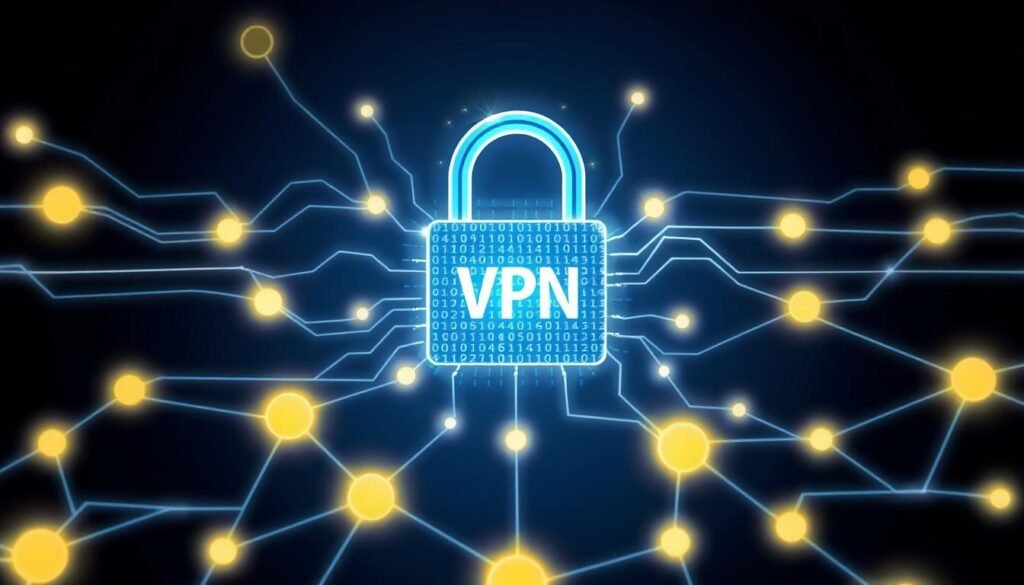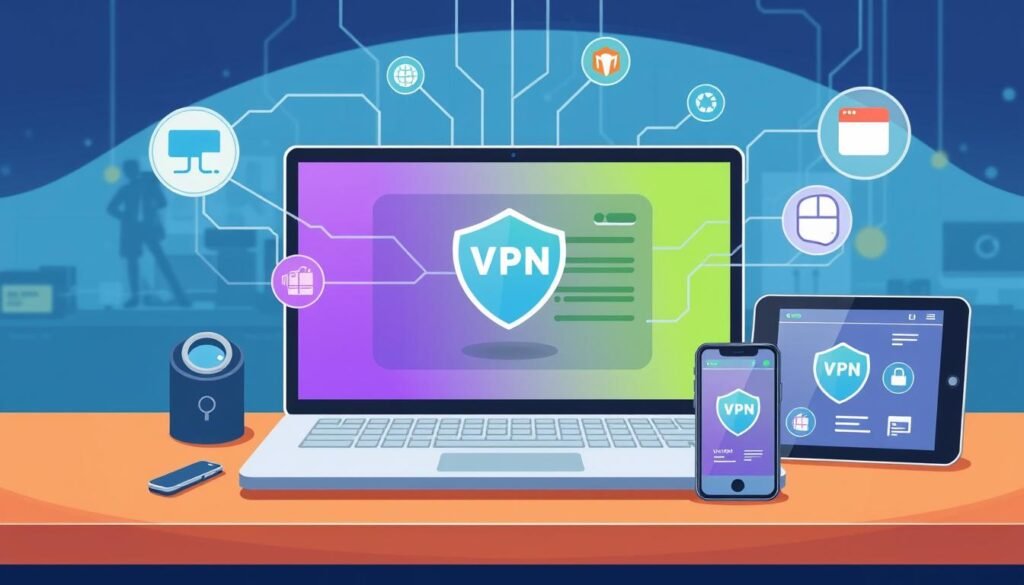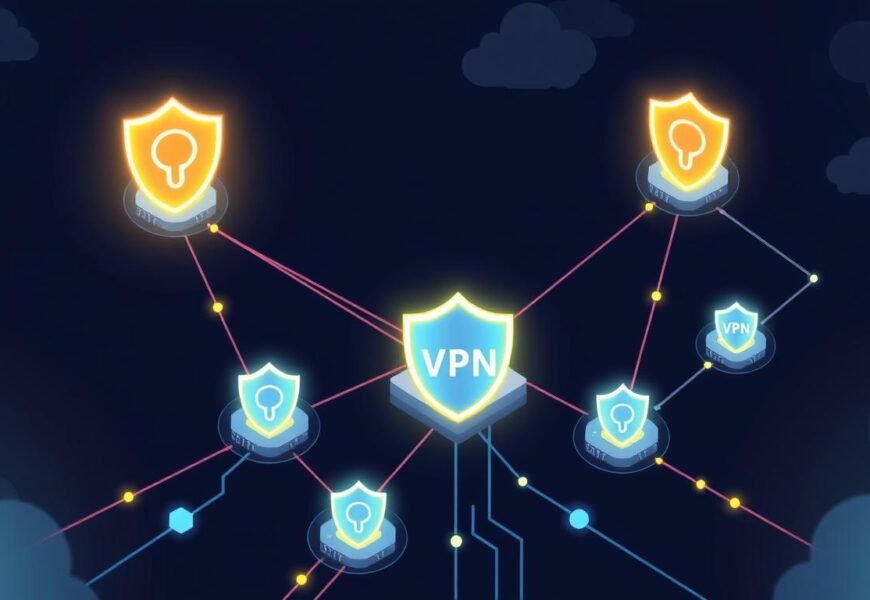In today’s world, online threats and surveillance are common. A Virtual Private Network (VPN) is key for keeping your online life safe. But with many VPNs out there, picking the right one can be tough. Knowing the top features of a VPN is crucial.
So, what makes a VPN stand out? What features should you look for in a VPN service?
Key Takeaways
- Prioritize a VPN with a wide range of high-speed servers to ensure smooth streaming and browsing.
- Look for strong encryption standards like AES-256 and advanced security protocols like OpenVPN, IKEv2, and WireGuard.
- Ensure your VPN supports at least 5 simultaneous connections for use across multiple devices.
- Choose a VPN with a strict no-logs policy and third-party audits to guarantee your privacy.
- Opt for a VPN that is compatible with your favorite streaming platforms for unrestricted access to content.
Understanding VPN Security and Privacy Fundamentals
A Virtual Private Network (VPN) is a strong tool for online security. It sends your internet traffic through secure servers. This stops hackers from getting your IP address and watching what you do online.
VPNs add more security than the HTTPS found on many sites.
What Makes a VPN Secure
VPNs hide your IP address, which shows where you are. They use strong encryption like public-key (asymmetric) and symmetric encryption. The Advanced Encryption Standard (AES) is often used.
This keeps your data safe from others seeing it.
The Importance of Privacy in VPN Services
Privacy is key when picking a VPN. The VPN’s privacy policy should be clear. It should say how they collect data and if they use third-party trackers.
A strict no-logs policy is important. It keeps your data safe and stops breaches.
How VPNs Protect Your Online Identity
VPNs hide your IP address and encrypt your internet. This protects your online identity. It stops IP address tracking and keeps your location and other info safe.
With a good VPN, you can surf the web safely. You’ll know your online privacy and security are in good hands.
“A good VPN is essential for maintaining online privacy and security in today’s digital landscape.”
Server Network and Global Coverage
Choosing a VPN service means looking at its server network size and reach. A strong VPN server network gives you fast connection speeds and access to many server locations worldwide.
Top VPNs like Private Internet Access (PIA) have servers in over 90 countries. This gives you access to content from anywhere. PIA’s 10 Gbps servers make streaming, gaming, and file sharing smooth.
- PIA offers servers in 91 countries for instant global access
- PIA’s 10 Gbps server network ensures lightning-fast connection speeds
- Unlimited bandwidth enables unrestricted streaming, gaming, and torrenting
Other top VPNs, like NordVPN, ExpressVPN, and Surfshark, also have large server networks. They have thousands of servers across dozens of countries. This wide server location is key for accessing content and avoiding censorship.
“The size and global reach of a VPN’s server network are critical factors in determining its performance and versatility.”
When picking a VPN, look for ones that keep growing their server network. They should also keep their infrastructure up to date. This ensures they meet your needs now and in the future.
Encryption Standards and Security Protocols
Robust encryption is key for VPN security. The Advanced Encryption Standard (AES) is a top choice. It uses 128-bit, 192-bit, or 256-bit keys, offering top-notch protection against cyber threats.
Choosing the right VPN protocol also matters a lot. Protocols like OpenVPN, IKEv2, and WireGuard use different encryption types. They make sure your online activities and data stay safe from unwanted eyes.
Kill Switch Technology
The kill switch is another must-have feature. It cuts off your internet if the VPN drops, keeping your data safe. This is key to keeping your privacy and stopping data leaks, even when the VPN goes down.
With strong encryption, top VPN protocols, and a reliable kill switch, a great VPN service protects you. It keeps your online activities and personal info safe from hackers, surveillance, and ISP throttling.

“Encryption is the bedrock of online security, and the choice of VPN protocol can make all the difference in ensuring your data remains protected.”
VPN Features That Matter Most
When picking a VPN service, look for key features. These include strong security, privacy, and performance. Important features are strong encryption, a wide server network, and a strict no-logs policy.
- Robust Encryption: Choose VPNs with advanced encryption like AES-256. It offers top protection for your online activities.
- Server Network Diversity: A big and varied server network lets you access content from different places. It helps you bypass geo-restrictions and ensures reliable connections.
- Strict No-Logs Policy: Make sure the VPN service doesn’t store or log your online activities. This keeps your privacy safe.
Other features can make your VPN experience better. Split tunneling lets you choose what traffic to encrypt. DNS leak protection stops privacy breaches. Ad blockers and anti-tracking tools can also speed up your browsing and keep you safe.
As the internet changes, features like IPv6 leak protection are getting more important. Some VPNs offer dedicated IP addresses. These can help you get past streaming service restrictions.
“Transparency in privacy policies and regular third-party audits are crucial for establishing trust in a VPN service.”
When checking out VPN providers, focus on those that value user privacy. Look for regular audits and a location with strong data protection laws.
Speed and Performance Optimization
Speed and performance are key when using a VPN. A good VPN should offer fast connections for smooth browsing and streaming. But, some VPNs can slow down your internet by a lot. Look for VPNs that focus on speed and have special features to boost performance.
Bandwidth Limitations
Check if a VPN has bandwidth limits. The best VPNs, like Aura, don’t limit your speed or bandwidth. This is great for streaming or gaming, where you need lots of bandwidth.
Server Speed Testing
Server performance is also important. Choose VPNs that test and improve their server speeds. NordVPN’s NordLynx protocol is fast. Features that pick the best server for you can also make your experience better.
Connection Stability
A stable VPN connection is essential. Good VPNs keep their connections steady, with little change in VPN speed, bandwidth, and server performance. Some VPNs let you choose which apps use the VPN, which can make things faster.
“A delay of even a few milliseconds can affect gaming performance or video streaming quality.”
Focus on VPN speed, bandwidth, server performance, and connection stability for a better online experience. Whether you’re browsing, streaming, or gaming, a fast and stable VPN makes a big difference.
Device Compatibility and Cross-Platform Support
Choosing a VPN service means making sure it works on all your devices. This includes Windows, macOS, iOS, Android, and Linux. It’s also important to find a VPN that works with smart TVs, gaming consoles, and streaming devices like Roku and Amazon Fire TV. Browser extensions for Chrome, Firefox, and Safari can also make your VPN more versatile.
Top VPN providers like IPVanish, NordVPN, and Proton VPN offer support for many devices. You can connect up to 10 or even unlimited devices at once. This is great for families with lots of devices that need protection.
Some VPNs make it easy to set up on routers. This way, you can protect your whole network, including smart TVs, gaming consoles, and IoT devices. Mobile and web apps offer different levels of protection. Device-wide VPN apps provide more security.
- Look for VPNs that let you connect up to 10 or unlimited devices at once.
- Make sure the VPN works on many platforms, like Windows, macOS, iOS, Android, and Linux.
- Check if the VPN has browser extensions and works with smart TVs, gaming consoles, and streaming devices.
- Consider VPNs that are easy to set up on routers to protect your whole network, including IoT devices.
- Compare the protection offered by mobile and web apps. Device-wide VPN apps offer more security.
By focusing on cross-platform VPN support and multi-device compatibility, you can keep your online activities safe on all devices. This ensures a smooth and secure digital experience.

“A VPN that supports all my devices is a game-changer. It gives me peace of mind knowing my online activities are secure, no matter which device I’m using.”
Data Logging Policies and Privacy Practices
Choosing a reliable VPN means looking closely at their data logging and privacy. A strict no-logs policy is key for keeping user info safe. It means the VPN doesn’t store IP addresses, browsing history, or connection details. But, some VPNs have been caught logging user data, even when they said they wouldn’t.
Zero-logs Policy Explained
A zero-logs or no-logs policy is the top choice for VPN privacy. It means the service doesn’t keep any user data, keeping users anonymous. It’s important to choose VPNs that are clear about what data they collect and keep. Vague policies might hide bad data practices.
Third-Party Audits
Third-party audits are crucial for checking a VPN’s privacy claims. These audits find weaknesses and push for better privacy. Reputable VPNs, like NordVPN, do regular audits to show they’re transparent and accountable.
Jurisdiction and Legal Compliance
The country where a VPN is based affects user privacy. VPNs in countries with strong privacy laws are safer than those in weak ones. For example, NordVPN uses transparency reports to tell users about legal data requests. This shows their dedication to privacy.
“A no-logs policy is vital for safeguarding online activities from both data theft and legal pressures.”
Streaming and Geo-Restriction Features
When picking a VPN, think about streaming and getting past geo-restrictions. A good VPN should have fast servers for video streaming. It should work well with big names like Netflix, Disney+, Hulu, Amazon Prime Video, and BBC iPlayer.
To beat geo-blocking, the VPN needs to update its IP addresses often. This keeps up with content providers trying to block VPN users. Some VPNs have special streaming servers for better performance. But, using a VPN might break the rules of some streaming services, so check the provider’s rules first.
VPNs with split tunneling are great for streaming. This lets you stream through the VPN while keeping other internet activities safe. It helps keep speeds up without losing privacy and security.
“Geoblocking is used to block or restrict access to content and services based on the user’s location, with the main tool being the checking of the user’s IP address.”
In the end, a good streaming VPN should let you watch your favorite shows without trouble, no matter where you are. Look at the VPN’s server network, its work with popular streaming sites, and how well it gets past geo-blocking. This way, you’ll find a VPN that lets you enjoy content access without limits.
Customer Support and Service Reliability
Choosing a VPN service means looking for good customer support. Make sure the provider has guides, FAQs, and tutorials to help you solve problems. Quick email responses, usually within 3 hours, show they care about your satisfaction.
The top VPNs offer 24/7 live chat support for quick help and phone support for more convenience. They also have a strong knowledge base and keep their services up to date. Look for VPNs that support many languages to help users worldwide.
The quality of VPN support is key to a great experience. Choose a provider that values customer service and responds quickly. They should help you through resources or live chat.
“A good VPN provider should offer 24/7 customer support to ensure users get the help they need, whenever they need it.”
Conclusion
Choosing the right VPN service is key. Look at security features, privacy policies, server network, speed, device compatibility, and customer support. A good VPN should have strong encryption, a no-logs policy, and a history of protecting user data.
Whether you need it for streaming, torrenting, or just keeping your data safe, pick a VPN that fits your needs. Getting a reliable VPN is crucial for your online safety and digital health.
Do your homework, read reviews, and try free trials or money-back offers. This way, you can see how well a VPN works before you pay for it. With the right VPN, you’ll get better online security, strong privacy protection, and more internet freedom.









